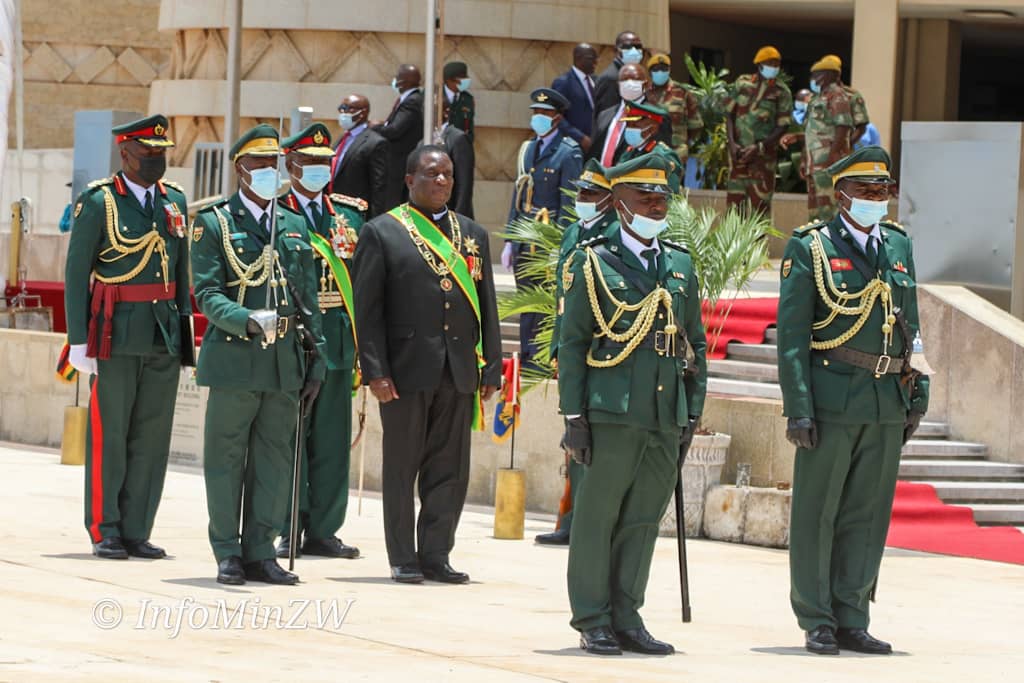President Mnangagwa says economy primed for growth
Share

Harare (New Ziana) – Tight monetary and fiscal policy measures introduced by the government earlier in the year are bearing fruit, with mining and agriculture responding strongly in the form of increased export earnings, putting the entire economy on a firm growth path, President Emmerson Mnangagwa said on Wednesday.
Delivering a State of the Nation address, he said through a combination of monetary and fiscal policy instruments, the government managed to douse an inflation hurricane that had swirled in the country earlier this year.
For example, President Mnangagwa said gold coins introduced by the central bank had sucked out billions of dollars from the market which could have otherwise ended up on the black currency market, thereby driving up inflation.
“The period since my last address to this Parliament has seen unprecedented socio-economic growth as well as the accelerated implementation of the National Development Strategy 1. Tight monetary and fiscal policy measures to stabilise the economy and curtail speculative borrowing and other rent-seeking behaviour, are bearing fruit.
“Month-on-month inflation for September significantly declined to 3.5 percent from 12.4 percent in August 2022. Every Zimbabwean must jealously guard this stability,” he said.
“Gold coins valued at ZW$9.5 billion were sold as of 30th September 2022. Smaller denominations of the gold coins have been unveiled by the Reserve Bank of Zimbabwe to broaden access and inclusivity. Meanwhile, foreign currency earnings amounted to US$7.7 billion for the 8 months up to 31st August 2022. This reflects a 32.4 percent increase from the US$5.8 billion recorded over the corresponding period in 2021.”
In mining, President Mnangagwa said output growth was evident in gold, coal, chrome, platinum group metals and related minerals.
The commissioning of the Cam and Motor Mine Biox Plant, Radnor Mine and the expansion of Blanket Mine, among others, coupled with contributions from artisanal miners, had resulted in increased gold production.
“The government is decisively dealing with illegal mining and smuggling of precious minerals. All players in the sector are once again urged to operate legally and in an environmentally sustainable manner,” President Mnangagwa said.
Realising that the growing economy would need additional power supplies, he said the government was frantically working on expanding the country’s generating capacity.
“The economy is growing faster than power supply. The Hwange Unit 7 is expected to be commissioned by year end. A further 300 MW from Unit 8 is expected to come on-stream by the second quarter of 2023. Efforts are on-going to expand the country’s energy mix, with focus on renewable energy,” he said.
The manufacturing sector, President Mnangagwa said, was also showing positive signs of a strong rebound.
“The rebound of the manufacturing sector is encouraging, with industrial capacity utilisation exceeding 66 percent in 2022, up from 47 percent in 2020. The implementation of the Local Content Strategy has seen the introduction of new products that are critical in the agriculture, mining and transport sectors, among others.”
Also in aid of the current economic development agenda, President Mnangagwa said modern and efficient infrastructure was being built.
For example, he said, more than 340 kilometres of the Harare-Beitbridge Road had been completed and opened to traffic, while construction of the Mbudzi Interchange was well underway.
“Local companies contracted on the Emergency Road Rehabilitation Programme have created both direct and indirect jobs. Considerable progress has been made on airstrips such as Binga and Bumi Hills, while the upgrading and modernisation of the Robert Gabriel Mugabe International Airport is on schedule.
“Phase one of the Beitbridge Border Post Modernisation Project is complete and now open to the public. The tourism and hospitality sector is on a rapid post-Covid-19 recovery path and more airlines are servicing our routes,” he said.
President Mnangagwa said State Enterprises and Parastatals also had a great role to play in the current economic development agenda.
As such, he said, their profitability and efficiency remained a top priority of the government, with several strategies being pursued in order to achieve this.
“The Grain Marketing Board demerger has separated the Strategic Grain Reserve from the Commercial division. Zimbabwe Mining Development Corporation subsidiaries have been recapitalised and strengthened through joint venture partnerships. Furthermore, the Airports Company of Zimbabwe and the Civil Aviation Authority of Zimbabwe are now operating as two distinct companies,” he said.
Highlighting the importance of technology in the development agenda, President Mnangagwa said this, for example, had seen Zimbabwe, for the first time undertaking a digital Population and Housing Census, replacing the traditional paper-based system.
Results were delivered within a record time of less than three months.
“This is a sample of the importance of technologies and innovation in the improvement of our systems. The Competence-Based Curriculum in primary and secondary schools supports the transition from school to the world of work through study of sciences, technology, innovation and the production of goods and services.
“Our education revolution dubbed “Chimurenga Chepfungwa” is progressing at an accelerated pace. Robust innovation and industrialisation ecosystems now characterise our Universities and Colleges with more and more of our young talented boys and girls registering patents, start-ups and breakthrough inventions. These will continue to be nurtured for commercialisation as we leap forward the modernisation and industrialisation of our motherland. Zimbabwe recently launched our first satellite, ZimSat-1 into Space. This will have far reaching impacts on all sectors of the economy, including agriculture, mining, as well as weather and land management systems.”
In the health sector, President Mnangagwa said the government remained determined to achieve Universal Health Coverage.
This, he said, was being done through the speeding up of renovation and the construction of new health centres, clinics and district hospitals.
“The new Pathology and Diagnostic Centre at Midlands State University, with state-of-the-art equipment has increased community access to related services. The Simon Mazorodze School of Medical and Health Sciences has been established as part of a comprehensive programme to enhance the training of Medical Practitioners in the country. This becomes the fourth Medical and Health Sciences School in our country,” he said.
Increased focus on technology would also enable a massive roll-out of the e-government system.
“Citizens should be able to obtain permits, licences and personal documents without visiting government offices. To date, the use of information communication technologies has greatly enhanced service delivery within the Civil Registry Department, which is now issuing passports more efficiently,” he said.
New Ziana









